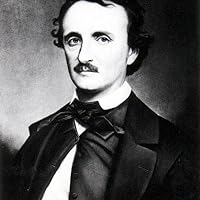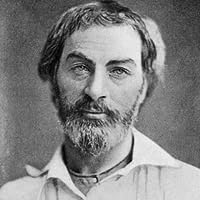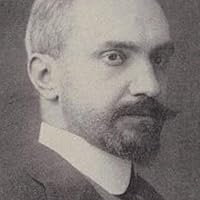Whitman Quotes
Quotes tagged as "whitman"
Showing 1-20 of 20

“I saw thee once - only once - years ago:
I must not say how many - but not many.
It was a July midnight; and from out
A full-orbed moon, that, like thine own soul, soaring,
Sought a precipitate pathway up through heaven,
There fell a silvery-silken veil of light,
With quietude, and sultriness, and slumber,
Upon the upturn'd faces of a thousand
Roses that grew in an enchanted garden,
Where no wind dared stir, unless on tiptoe -
Fell on the upturn'd faces of these roses
That gave out, in return for the love-light,
Their odorous souls in an ecstatic death -
Fell on the upturn'd faces of these roses
That smiled and died in the parterre, enchanted
By thee, and by the poetry of thy presence.
Clad all in white, upon a violet bank
I saw thee half reclining; while the moon
Fell upon the upturn'd faces of the roses,
And on thine own, upturn'd - alas, in sorrow!
Was it not Fate, that, on this July midnight -
Was it not Fate, (whose name is also Sorrow,)
That bade me pause before that garden-gate,
To breathe the incense of those slumbering roses?
No footsteps stirred: the hated world all slept,
Save only thee and me. (Oh, Heaven! - oh, G**!
How my heart beats in coupling those two words!)
Save only thee and me. I paused - I looked -
And in an instant all things disappeared.
(Ah, bear in mind the garden was enchanted!)
The pearly lustre of the moon went out:
The mossy banks and the meandering paths,
The happy flowers and the repining trees,
Were seen no more: the very roses' odors
Died in the arms of the adoring airs.
All - all expired save thee - save less than thou:
Save only divine light in thine eyes -
Save but the soul in thine uplifted eyes.
I saw but them - they were the world to me.
I saw but them - saw only them for hours -
Saw only them until the moon went down.
What wild heart-histories seemed to lie enwritten
Upon those crystalline, celestial spheres!
How dark a wo! yet how sublime a hope!
How silently serene a sea of pride!
How daring an ambition! yet how deep -
How fathomless a capacity for love!
But now, at length, dear Dian sank from sight,
Into a western couch of thunder-cloud;
And thou, a ghost, amid the entombing trees
Didst glide away. Only thine eyes remained.
They would not go - they never yet have gone.
Lighting my lonely pathway home that night,
They have not left me (as my hopes have) since.
They follow me - they lead me through the years.
They are my ministers - yet I their slave.
Their office is to illumine and enkindle -
My duty, to be saved by their bright fire,
And purified in their electric fire,
And sanctified in their elysian fire.
They fill my soul with Beauty (which is Hope,)
And are far up in Heaven - the stars I kneel to
In the sad, silent watches of my night;
While even in the meridian glare of day
I see them still - two sweetly scintillant
Venuses, unextinguished by the sun!”
― The Raven and Other Poems
I must not say how many - but not many.
It was a July midnight; and from out
A full-orbed moon, that, like thine own soul, soaring,
Sought a precipitate pathway up through heaven,
There fell a silvery-silken veil of light,
With quietude, and sultriness, and slumber,
Upon the upturn'd faces of a thousand
Roses that grew in an enchanted garden,
Where no wind dared stir, unless on tiptoe -
Fell on the upturn'd faces of these roses
That gave out, in return for the love-light,
Their odorous souls in an ecstatic death -
Fell on the upturn'd faces of these roses
That smiled and died in the parterre, enchanted
By thee, and by the poetry of thy presence.
Clad all in white, upon a violet bank
I saw thee half reclining; while the moon
Fell upon the upturn'd faces of the roses,
And on thine own, upturn'd - alas, in sorrow!
Was it not Fate, that, on this July midnight -
Was it not Fate, (whose name is also Sorrow,)
That bade me pause before that garden-gate,
To breathe the incense of those slumbering roses?
No footsteps stirred: the hated world all slept,
Save only thee and me. (Oh, Heaven! - oh, G**!
How my heart beats in coupling those two words!)
Save only thee and me. I paused - I looked -
And in an instant all things disappeared.
(Ah, bear in mind the garden was enchanted!)
The pearly lustre of the moon went out:
The mossy banks and the meandering paths,
The happy flowers and the repining trees,
Were seen no more: the very roses' odors
Died in the arms of the adoring airs.
All - all expired save thee - save less than thou:
Save only divine light in thine eyes -
Save but the soul in thine uplifted eyes.
I saw but them - they were the world to me.
I saw but them - saw only them for hours -
Saw only them until the moon went down.
What wild heart-histories seemed to lie enwritten
Upon those crystalline, celestial spheres!
How dark a wo! yet how sublime a hope!
How silently serene a sea of pride!
How daring an ambition! yet how deep -
How fathomless a capacity for love!
But now, at length, dear Dian sank from sight,
Into a western couch of thunder-cloud;
And thou, a ghost, amid the entombing trees
Didst glide away. Only thine eyes remained.
They would not go - they never yet have gone.
Lighting my lonely pathway home that night,
They have not left me (as my hopes have) since.
They follow me - they lead me through the years.
They are my ministers - yet I their slave.
Their office is to illumine and enkindle -
My duty, to be saved by their bright fire,
And purified in their electric fire,
And sanctified in their elysian fire.
They fill my soul with Beauty (which is Hope,)
And are far up in Heaven - the stars I kneel to
In the sad, silent watches of my night;
While even in the meridian glare of day
I see them still - two sweetly scintillant
Venuses, unextinguished by the sun!”
― The Raven and Other Poems

“I have said that the soul is not more than the body,
And I have said that the body is not more than the soul,
And nothing, not God, is greater to one than one's-self is,”
―
And I have said that the body is not more than the soul,
And nothing, not God, is greater to one than one's-self is,”
―

“when Whitman wrote, “I sing the body electric”
I know what he
meant
I know what he
wanted:
to be completely alive every moment
in spite of the inevitable.
we can’t cheat death but we can make it
work so hard
that when it does take
us
it will have known a victory just as
perfect as
ours”
―
I know what he
meant
I know what he
wanted:
to be completely alive every moment
in spite of the inevitable.
we can’t cheat death but we can make it
work so hard
that when it does take
us
it will have known a victory just as
perfect as
ours”
―

“And I can’t help but feel that Whitman, for all his blustering beauty, might have been just a bit too optimistic. We can hear others, and we can travel to them without moving, and we can imagine them, and we are all connected one to the other by a crazy root system like so many leaves of grass — but the game makes me wonder whether we can really ever fully become one another.”
― Paper Towns
― Paper Towns
“Books had rescued me when i most needed saving... Books were smarter than me and words inspired me... to try something new, charge forward without a clear understanding of what would happen next, because "given something like death, what does it matter if one looks foolish now and then, or tries too hard, or cares too deeply?"
In the end, Thoreau, Whitman, Hafiz, and a dozen other writers put me up to the task of seeing if I dared to "live a life worth living.”
―
In the end, Thoreau, Whitman, Hafiz, and a dozen other writers put me up to the task of seeing if I dared to "live a life worth living.”
―

“Undrape! you are not guilty to me, nor stale nor discarded,
I see through the broadcloth and gingham whether or no,
And am around, tenacious, acquisitive, tireless, and cannot be shaken away.”
― Song of Myself
I see through the broadcloth and gingham whether or no,
And am around, tenacious, acquisitive, tireless, and cannot be shaken away.”
― Song of Myself

“To the bankrupt poet, to the jilted lover, to anyone who yearns to elude the doubt within and the din without, the tidal strait between Manhattan Island and her favorite suburb offers the specious illusion of easy death. Melville prepared for the plunge from the breakwater on the South Street promenade, Whitman at the railing of the outbound ferry, both men redeemed by some Darwinian impulse, maybe some epic vision, which enabled them to change leaden water into lyric wine. Hart Crane rejected the limpid estuary for the brackish swirl of the Caribbean Sea. In each generation, from Washington Irving’s to Truman Capote’s, countless young men of promise and talent have examined the rippling foam between the nation’s literary furnace and her literary playground, questioning whether the reams of manuscript in their Brooklyn lofts will earn them garlands in Manhattan’s salons and ballrooms, wavering between the workroom and the water. And the city had done everything in its power to assist these men, to ease their affliction and to steer them toward the most judicious of decisions. It has built them a bridge.”
― The Biology of Luck
― The Biology of Luck

“Lilac and star and bird twined with the chant of my soul,
There in the fragrant pines and the cedars dusk and dim.”
― Leaves of Grass
There in the fragrant pines and the cedars dusk and dim.”
― Leaves of Grass

“I’ll project myself into several futures simultaneously,” I should have said, “a minor tremor in my hand; I’ll work my way from irony to sincerity in the sinking city, a would-be Whitman of the vulnerable grid.”
― 10:04
― 10:04

“I depart as air .... I shake my white locks at the runaway sun,
I effuse my flesh in eddies and drift it in lacy jags.
I bequeath myself to the dirt to grow from the grass I love,
If you want me again look for me under your bootsoles.”
― Leaves of Grass
I effuse my flesh in eddies and drift it in lacy jags.
I bequeath myself to the dirt to grow from the grass I love,
If you want me again look for me under your bootsoles.”
― Leaves of Grass

“Expression of speech .. in what is written or said forget not that silence is also expressive,
That anguish as hot as the hottest and contempt as cold as the coldest may be without words,
That the true adoration is likewise without words and without kneeling.”
― Leaves of Grass
That anguish as hot as the hottest and contempt as cold as the coldest may be without words,
That the true adoration is likewise without words and without kneeling.”
― Leaves of Grass

“This hour I tell things in confidence.
I might not tell everybody, but I will tell you.
To publish these lines is, of course, to tell everybody. Much as he wants to take us into his confidence, seduce with the warmth and directness of his voice, he's also making one of his sly jokes: he's created an intimacy with all the doors and windows open, in which you could be anyone at all. Even as I laugh at the line, I feel the gesture of his arm around my shoulder, drawing my ear nearer his mouth. What is the difference, in a poem, between performed intimacy and the real thing? What, in a work of art, is not performed? Whitman, perhaps more than any poet before him, explored and exploited poetry's strange duality. In the best poems, we feel the poet's breath, the almost-physical presence of the speaker created by all the tools at the writer's disposal. I sometimes feel that Walt has just walked into the room, as present now as he ever was, a sensual, breathing body that he somehow seems to have constructed of nothing but words.”
― What Is the Grass: Walt Whitman in My Life
I might not tell everybody, but I will tell you.
To publish these lines is, of course, to tell everybody. Much as he wants to take us into his confidence, seduce with the warmth and directness of his voice, he's also making one of his sly jokes: he's created an intimacy with all the doors and windows open, in which you could be anyone at all. Even as I laugh at the line, I feel the gesture of his arm around my shoulder, drawing my ear nearer his mouth. What is the difference, in a poem, between performed intimacy and the real thing? What, in a work of art, is not performed? Whitman, perhaps more than any poet before him, explored and exploited poetry's strange duality. In the best poems, we feel the poet's breath, the almost-physical presence of the speaker created by all the tools at the writer's disposal. I sometimes feel that Walt has just walked into the room, as present now as he ever was, a sensual, breathing body that he somehow seems to have constructed of nothing but words.”
― What Is the Grass: Walt Whitman in My Life

“... What living and buried speech is vibrating here... what howls restrained by decorum...”
― Leaves of Grass
― Leaves of Grass

“But to bring perhaps from afar what is already founded,
To give it our own identity, average, limitless, free,
To fill the gross the torpid bulk with vital religious fire,
Not to repel or destroy so much as accept, fuse, rehabilitate,
To obey as well as command, to follow more than to lead,
These also are the lessons of our New World;
While how little the New after all, how much the Old, Old World!
- Song of the exposition”
― The Collected Poems of Walt Whitman
To give it our own identity, average, limitless, free,
To fill the gross the torpid bulk with vital religious fire,
Not to repel or destroy so much as accept, fuse, rehabilitate,
To obey as well as command, to follow more than to lead,
These also are the lessons of our New World;
While how little the New after all, how much the Old, Old World!
- Song of the exposition”
― The Collected Poems of Walt Whitman

“Come Muse migrate from Greece and Ionia,
Cross out please those immensely overpaid accounts,
That matter of Troy and Achilles' wrath, and Aeneas', Odysseus'
wanderings,
Placard "Removed" and "To Let" on the rocks of your snowy
Parnassus,
Repeat at Jerusalem, place the notice high on Jaffa's gate and on
Mount Moriah,
The same on the walls of your German, French and Spanish
castles, and Italian collections,
For know a better, fresher, busier sphere, a wide, untried domain
awaits, demands you.
- Song of the Exposition”
― The Complete Poems
Cross out please those immensely overpaid accounts,
That matter of Troy and Achilles' wrath, and Aeneas', Odysseus'
wanderings,
Placard "Removed" and "To Let" on the rocks of your snowy
Parnassus,
Repeat at Jerusalem, place the notice high on Jaffa's gate and on
Mount Moriah,
The same on the walls of your German, French and Spanish
castles, and Italian collections,
For know a better, fresher, busier sphere, a wide, untried domain
awaits, demands you.
- Song of the Exposition”
― The Complete Poems

“The President is there in the White House for you, it is not you
who are here for him,
The Secretaries act in their bureaus for you, not you here for them,
The Congress convenes every Twelfth-month for you,
Laws, courts, the forming of States, the charters of cities, the
going and coming of commerce and mails, are all for you.
List close my scholars dear,
Doctrines, politics and civilization exurge from you,
Sculpture and monuments and any thing inscribed anywhere are
tallied in you,
The gist of histories and statistics as far back as the records reach
is in you this hour, and myths and tales the same,
If you were not breathing and walking here, where would they
all be?
The most renown'd poems would be ashes, orations and plays
would be vacuums.”
― The Complete Poems
who are here for him,
The Secretaries act in their bureaus for you, not you here for them,
The Congress convenes every Twelfth-month for you,
Laws, courts, the forming of States, the charters of cities, the
going and coming of commerce and mails, are all for you.
List close my scholars dear,
Doctrines, politics and civilization exurge from you,
Sculpture and monuments and any thing inscribed anywhere are
tallied in you,
The gist of histories and statistics as far back as the records reach
is in you this hour, and myths and tales the same,
If you were not breathing and walking here, where would they
all be?
The most renown'd poems would be ashes, orations and plays
would be vacuums.”
― The Complete Poems

“Such is a community
of inviolable immunity, protected
from tampering or harpooning
mutiny. Every better thinker’s impulse
to shrink us (at the shoreline from our
lifeblood’s deep pulse) uses disparaging
scrutiny to sink us.”
―
of inviolable immunity, protected
from tampering or harpooning
mutiny. Every better thinker’s impulse
to shrink us (at the shoreline from our
lifeblood’s deep pulse) uses disparaging
scrutiny to sink us.”
―

“Therefore Whitman failed radically in his dearest ambition: he can never be a poet of the people. For the people, like the early races whose poetry was ideal, are natural believers in perfection. They have no doubts about the absolute desirability of wealth and learning and power, none about the worth of pure goodness and pure love. Their chosen poets, if they have any, will he always those who have known how to paint these ideals in lively even if in gaudy colours. Nothing is farther from the common people than the corrupt desire to be primitive. They instinctively look toward a more exalted life, which they imagine to be full of distinction and pleasure, and the idea of that brighter existence fills them with hope or with envy or with humble admiration.
If the people are ever won over to hostility to such ideals, it is only because they are cheated by demagogues who tell them that if all the flowers of civilization were destroyed its fruits would become more abundant. A greater share of happiness, people think, would fall to their lot could they destroy everything beyond their own possible possessions. But they are made thus envious and ignoble only by a deception: what they really desire is an ideal good for themselves which they are told they may secure by depriving others of their preeminence. Their hope is always to enjoy perfect satisfaction themselves; and therefore a poet who loves the picturesque aspects of labour and vagrancy will hardly be the poet of the poor. He may have described their figure and occupation, in neither of which they are much interested; he will not have read their souls. They will prefer to him any sentimental story-teller, any sensational dramatist any moralizing poet; for they are hero-worshippers by temperament, and are too wise or too unfortunate to be much enamoured of themselves or of the conditions of their existence.”
―
If the people are ever won over to hostility to such ideals, it is only because they are cheated by demagogues who tell them that if all the flowers of civilization were destroyed its fruits would become more abundant. A greater share of happiness, people think, would fall to their lot could they destroy everything beyond their own possible possessions. But they are made thus envious and ignoble only by a deception: what they really desire is an ideal good for themselves which they are told they may secure by depriving others of their preeminence. Their hope is always to enjoy perfect satisfaction themselves; and therefore a poet who loves the picturesque aspects of labour and vagrancy will hardly be the poet of the poor. He may have described their figure and occupation, in neither of which they are much interested; he will not have read their souls. They will prefer to him any sentimental story-teller, any sensational dramatist any moralizing poet; for they are hero-worshippers by temperament, and are too wise or too unfortunate to be much enamoured of themselves or of the conditions of their existence.”
―
All Quotes
|
My Quotes
|
Add A Quote
Browse By Tag
- Love Quotes 97.5k
- Life Quotes 76k
- Inspirational Quotes 73k
- Humor Quotes 44k
- Philosophy Quotes 29.5k
- Inspirational Quotes Quotes 27k
- God Quotes 26k
- Truth Quotes 23.5k
- Wisdom Quotes 23.5k
- Romance Quotes 23k
- Poetry Quotes 22k
- Death Quotes 20k
- Happiness Quotes 18.5k
- Life Lessons Quotes 18.5k
- Hope Quotes 18k
- Faith Quotes 18k
- Quotes Quotes 16.5k
- Inspiration Quotes 16.5k
- Spirituality Quotes 15k
- Religion Quotes 15k
- Motivational Quotes 15k
- Writing Quotes 15k
- Relationships Quotes 14.5k
- Life Quotes Quotes 14k
- Love Quotes Quotes 14k
- Success Quotes 13.5k
- Time Quotes 12.5k
- Motivation Quotes 12k
- Science Quotes 11.5k
- Motivational Quotes Quotes 11.5k


